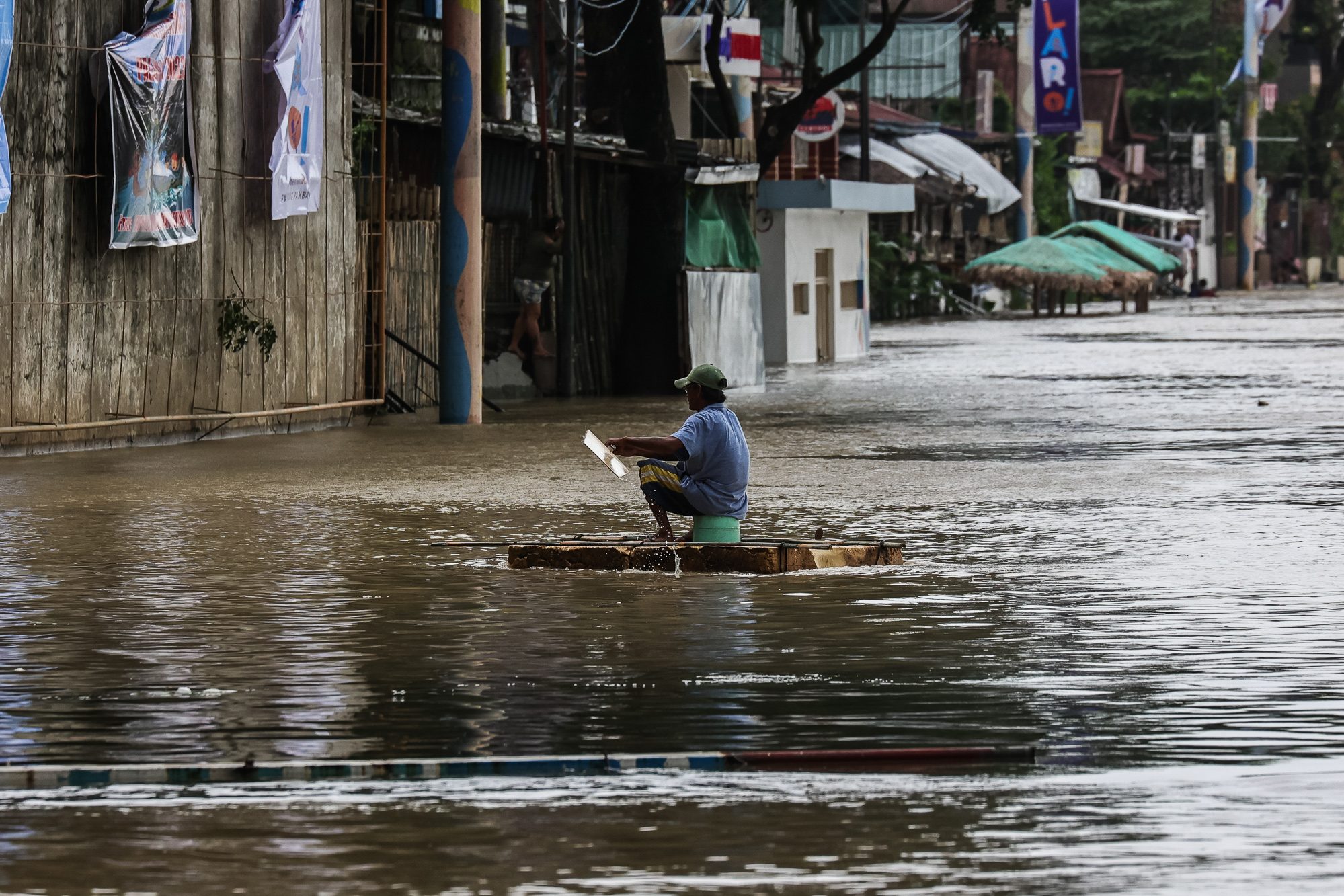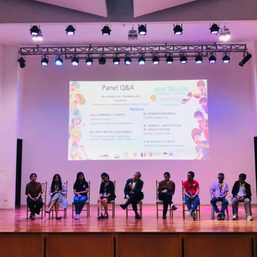SUMMARY
This is AI generated summarization, which may have errors. For context, always refer to the full article.

MANILA, Philippines – More Filipinos from the poorest socioeconomic bracket believe that calamities are God’s ways of punishing people for their evil ways, a recent Pulse Asia Research Incorporated survey said.
Filipinos from Class E who hold this belief rose to 29% in September 2023 compared to 13% in June 2022, according to a Pulse Asia survey published on Monday, October 9.
This is an increase of 16 percentage points in over a year, a significant change given that the survey’s error margin is ± 2.8%. The survey was conducted among 1,200 adult respondents from September 10 to 14.
For them, the “primary reason why calamities happen” is that these are “God’s warning or punishment to nations turning to evil ways.”
In general, across the country, 21% of respondents hold this belief as of September 2023 – higher than the 15% recorded in June 2022.
Nearly half of respondents, or 46%, still believe that calamities are caused by the “destructive ways of people who regularly abuse the environment,” while 32% think it is because of “natural processes that regularly occur worldwide.”
Rodne Galicha, executive director of the faith-based environmental group Living Laudato Si’ Philippines, said he “got goosebumps” upon learning of the survey results.
“It’s alarming but, at the same time, it may be a wake-up call,” Galicha said in an interview with Rappler on Wednesday, October 11.

He said the Catholic Church, the government, the academe, and other sectors may have failed in “reaching out to people explaining the basic science” of climate change.
He added in a mix of English and Filipino, “It’s alarming because the work of human beings is being blamed on God, because science will always say it is anthropogenic,” which means it is the effect of humans’ interaction with nature. “This just shows that we failed actually to be stewards of God’s creation.”
Image of a punishing God
Sister Eleanor Llanes, who belongs to the Missionary Sisters of the Immaculate Heart of Mary (ICM), pointed out that the respondents are a mix of Filipinos from different religions, not only Catholics. Llanes said many of them “have no deep formation about the Church, about God.”
“We have so many beautiful documents as Catholics, but the basic catechism of a Catholic, or a Protestant, or these 29%, hardly evolved,” she told Rappler in a mix of English and Filipino.
“What is the image of God of these people? The image that they have is the image of a punishing God. Looking at my image of God, that’s not how I think of my God. My God is a merciful, compassionate, liberating God,” Llanes said on Wednesday.
Llanes, who worked in Brazil for 24 years, echoes the tenets of liberation theology, a Catholic school of thought born in Latin America that emphasizes justice for the poor and needy.
She and her sisters in the ICM congregation have, in recent years, also espoused Creation Spirituality, which focuses on caring for God’s creation. “In Creation Spirituality, the God we are proclaiming is a God who is gratuitous, who is life-giving, who is beautiful,” she said.
“I will never imagine a God who punishes us, who will create all these floods so that people will just die. For us, advocates of Creation Spirituality, we believe in science, the evolution of the world, the evolution of everything in this earth. We combine, we integrate that,” Llanes said.
She noted that the Bible, especially the Old Testament, is full of texts about a punishing God, but “we don’t literally interpret the Scriptures.”
Llanes said people should look at themselves when asking why calamities happen.
“People are really destroying the earth. We are ruthless towards water, we are ruthless towards trees because of greed, because of wanting more profit. We don’t need to ask, ‘Is it the Lord who is to blame for this?’ It’s not the Lord who is at fault. It is we who wreak destruction, it is we who cut the trees, it is we who do the mining, it is we who waste a lot of water,” she said.
“We are punishing ourselves. It’s not God punishing us,” Llanes said.
Colonial legacy?
This image of God as “punisher” has persisted in the Philippines for centuries.
The Philippines is the biggest predominantly Catholic country in Asia where nearly 79% of people belong to the Roman Catholic Church, the state religion for nearly four centuries under Spanish colonial rule.
With the Spanish having used religion to keep their subjects in tow, Filipinos have grown to view God as “punisher” – a perspective which, according to an analyst, even led them to elect Rodrigo Duterte, known as “the Punisher” of Davao City, as Philippine president.
A 2021 documentary by GMA’s Sandra Aguinaldo, “Batang Hari ng Tondo,” narrates how the Great Luzon Flood of 1972 was believed to have been God’s punishment for the theft of the iconic Santo Niño de Tondo statue. In his diary, the late dictator Ferdinand Marcos even recalled how the “sun came out” four days after his wife, Imelda, found the stolen image being sold for P2,800.
In 2009, a week after Tropical Storm Ondoy (Ketsana) brought unprecedented floods to Metro Manila, then-Catholic Bishops’ Conference of the Philippines (CBCP) president Jaro Archbishop Angel Lagdameo hinted that calamities were “God’s warning signs” in the face of “corruption and lies” of the Arroyo administration.
Succeeding CBCP presidents, however, took a different approach. In 2012, Cebu Archbishop Jose Palma said he hopes people do not view calamities as “punishment from the Lord,” because many of these “are also because of human factors.” In 2020, Davao Archbishop Romulo Valles spoke along the same lines.
“Unfortunately, persons who live close to volcanoes, or who build their homes along waterways, or who live along the corridor of typhoons and hurricanes are the victims of destruction and the hapless sufferers, not because God punishes them. It is not because God hates them, but because that is just the nature of this imperfect world,” Valles said in a January 2020 pastoral letter.
The Davao archbishop added: “God is purifying us how to treat Mother Nature as our common home. Though not all calamities can be caused by human activities, like earthquakes and volcanic eruptions, some are proven by science as human induced, like floods and droughts and typhoons. We should change our ways so as not to contribute to climate change which bring about ravages of nature. These calamities call for conversion. These calamities appeal for deeper compassion.” – Rappler.com
Add a comment
How does this make you feel?







![[OPINION] Demystifying net-zero and climate reporting in the Philippines](https://www.rappler.com/tachyon/2024/05/TL-climate-reporting-philippines-May-3-2024.jpg?resize=257%2C257&crop_strategy=attention)







There are no comments yet. Add your comment to start the conversation.